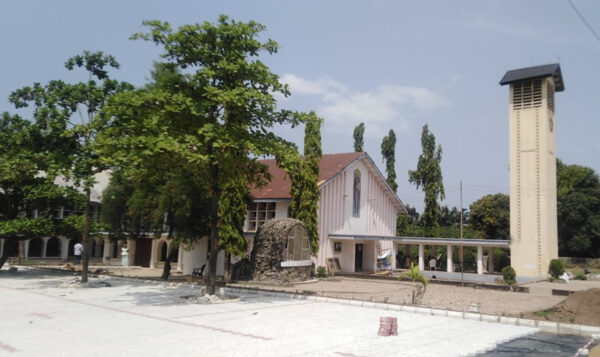
PROSPECT HEIGHTS — When a baby arrives in the West African nation of Nigeria, the mother keeps white powder on hand for visitors coming to see the newborn.
The people rub the chalk-like substance on their necks and faces — a celebratory act joined with singing and dancing to rejoice in the pure innocence of new life.
And so, it is for the Baby Jesus on Christmas Eve at St. Mark’s Parish in Ogoja, Nigeria, said Sister Elizabeth Ogbu, who grew up there.
Sister Elizabeth is a member of the Nigeria-based Daughters of Divine Love Congregation, which has a community in Brooklyn.

Sister Elizabeth said nativity scenes inside the churches are like others around the world, with each member of the Holy Family represented, but not the Three Kings; they don’t appear until Jan. 6, the Feast of the Epiphany.
Still, in Nigeria there is plenty of powder on hand for parishioners coming to midnight Mass to celebrate the Christ child bringing light to the world.
“That powder will always be in the manger with Jesus, Mary, and Joseph,” Sister Elizabeth said. “So, when you come, you can put the powder on your face.
“I’ve noticed with men, they usually only put it on their hands.”
Of course, southern Nigeria has a tropical climate, so forget snow. And don’t expect to see a lot of gift-giving fueled by seasonal commercialism.
Sister Elizabeth said the emphasis is on sharing gifts with the needy, principally food and sometimes treats.
Children from the parish’s Marian group that meets to pray the Rosary also join in charitable giving through the local Block Grocery Crusades.
“We go from block to block,” Sister Elizabeth said. “And we sing from house to house. When we get to your house, we play our instruments, our drums, and we will dance for you.
“Then, whatever you have, you bring it out.”
The kids collect food, candy, or drinks, and sometimes cash donations to buy even more items, all of which is distributed to poor people on Christmas Eve.
The fun continues at the parish’s annual Christmas concert, which includes a King and Queen contest for kids.
“There is always one girl child, and one boy child named the queen and the king of the year,” Sister Elizabeth said. “They are dressed in these beautiful traditional costumes, but they are kept in a special room somewhere in the church. We are always curious who was chosen, and what their costumes would be like.”
People who have a burning desire to know can purchase the privilege of meeting the king and queen early by “dropping” some candy or food which are also donated to the poor, Sister Elizabeth said.
These people get to visit the celebrities in the special room, but royalty’s names and descriptions of the costumes must be kept secret until later when they are finally introduced to the parish with much fanfare.
The queens wear flowing multi-colored gowns and head scarves. Kings might wear fez hats and knee-length Isiagu tops, often decorated with ornate motifs.
And was Sister Elizabeth ever picked to be queen?
She laughed and responded, “At one point I was!”
“It was fun,” she added. “And it was cool. You get to be so well dressed up in this beautiful costume. And the kids come around just to see you and to admire you. Every child loves to be the one to be chosen.”

But while holiday gift-giving is not emphasized in Nigeria, the average parishioner still enjoys a new set of Sunday-best clothes to wear on Christmas Day.
“Nigerians are very good with fashion,” Sister Elizabeth said. “They make a lot of dressing up. So, Christmas is a tradition that you have to get new clothes for that special day.
“And when you come to the church on Christmas, you see people, and you tell them, ‘Wow, how well dressed!’”
Christmas Day is spent, “with your cousins,” Sister Elizabeth said. Dinner is built around festive soups or stews, chicken, jollof rice, and fufu — a dish made from pounded yams. Some families also enjoy cake, she said.
“When I travel home, I like going at Christmas,” Sister Elizabeth said. “That’s when I catch all the fun. It’s a happy time, I tell you.”
Editor’s note: This is the sixth in a series of articles where five priests and one religious sister in the diocese — who come from other countries — reflect on their childhood parishes and hometowns at Christmas.
